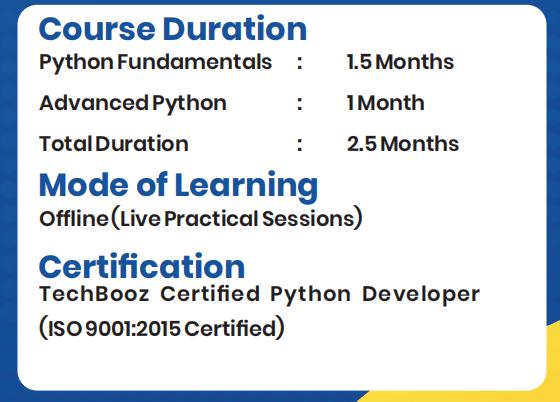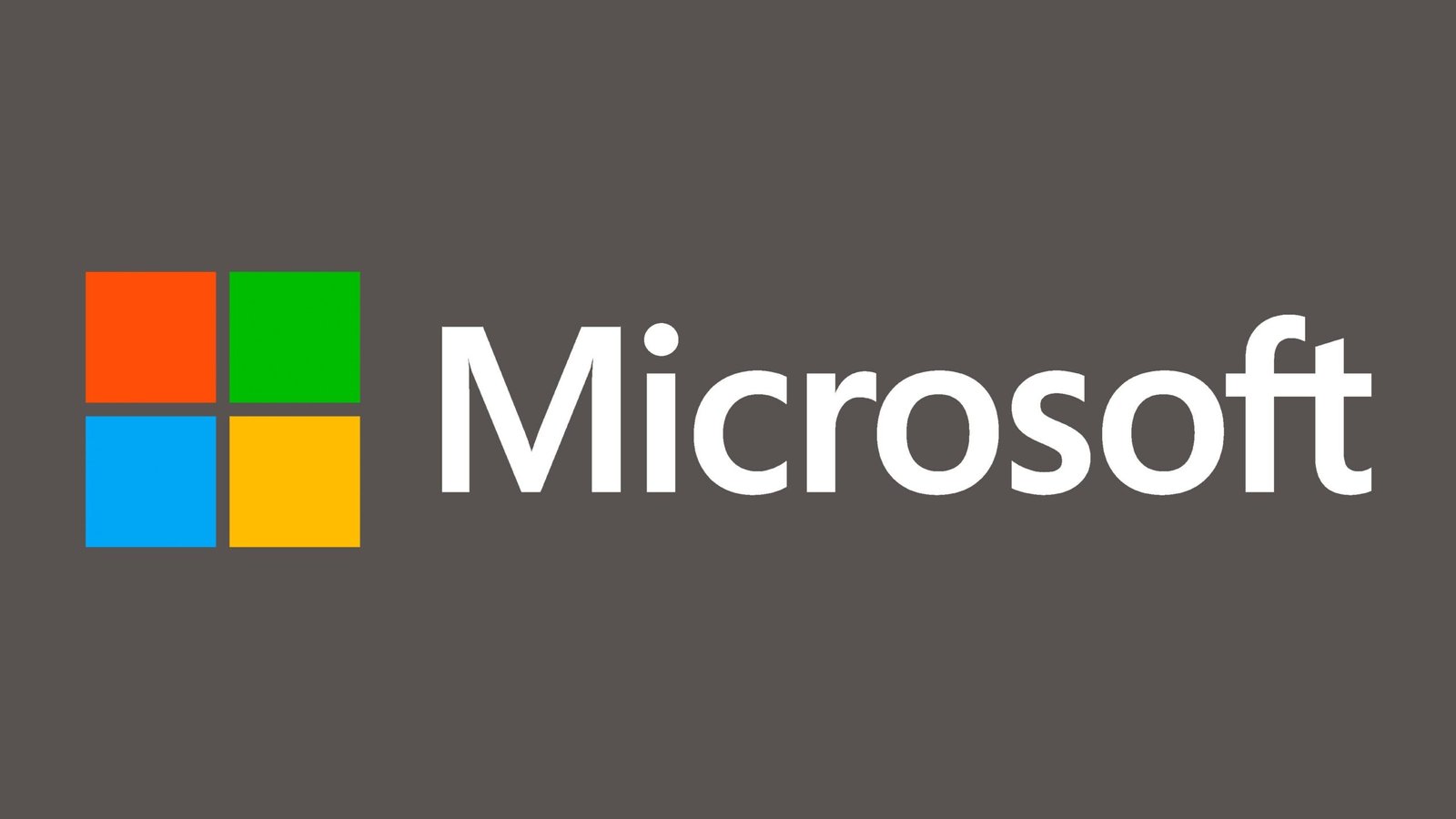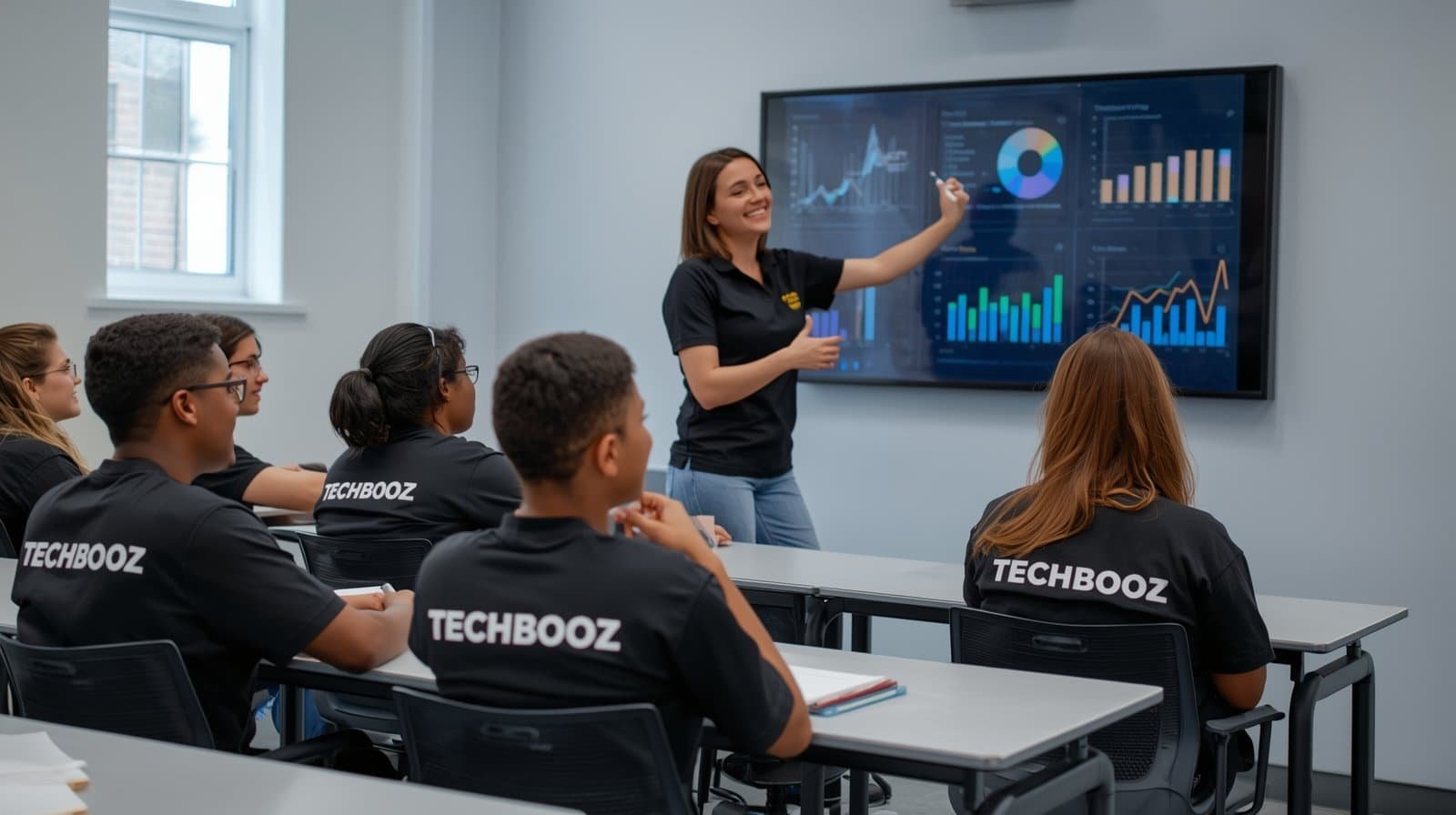Best Python Course in Karnal! The most practical Python course that prepares you with real-world projects.
Your Gateway to a career in Data Analytics, Data Science, Software Development, and Artificial Intelligence.
About The Course
Python is a popular and beginner-friendly programming language used in web development, automation, data handling, and artificial intelligence. At TechBooz, the course is structured to build strong fundamentals first and then move into advanced concepts, real projects, and interview-focused training.
Key Highlights
- Strong Foundation: Learn core concepts, logic building, and problem-solving
- Advanced Skills: Work on real-world projects and job-ready assignments
- Interview Preparation: Practice coding questions and scenarios used in companies
- ISO 9001:2015 Certified: Ensures high-quality training and globally recognized standards
What you Will Learn
Python Fundamentals
Learn Python basics, OOP setup, coding rules, conditions, loops, functions, strings, files, errors, classes, and problem-solving skills.
File Handling & Automation
Learn file operations, OS tasks, batch processing, scheduling, and creating simple automation scripts for daily workflows.
Error Handling & Debugging
Use try/except, custom errors, debugging tools, and write clean Python programs that handle mistakes safely and smoothly.
APIs & Web Requests
Learn how to send web requests, read JSON data, connect with simple APIs, and build small apps that use live online information.
Functional & Modular Programming
Learn decorators, generators, lambda functions, iterators, and how to build neat, modular programs for easy reuse.
Real-World Python Projects
Build small apps like a File Organizer, Quiz Game, Password Maker, or Mini Automation Script to practice your Python skills.
Who should learn python programming
Students who want to start learning programming
Beginners with zero coding experience
Working professionals looking to upgrade their skills
Career switchers aiming to enter the tech field
Freelancers who want to build automation and coding skills
Creators & entrepreneurs building tech-based projects

Top Companies Rely on Python




Why Choose techbooz
Learn Python step-by-step from basics to advanced with practical, interactive classroom sessions. Our teaching approach ensures you understand every concept clearly and build strong logic for real coding.
The course is led by experienced IT industry trainers who focus on real-world applications and project creation. You will work on practical tasks that help you gain confidence and hands-on experience.
Along with interview guidance and job-focused training, you receive an ISO 9001:2015 Certified course and a TechBooz Certificate upon successful completion, adding value to your career profile.
EXCELLENTTrustindex verifies that the original source of the review is Google. Best institute for advanced excelPosted onTrustindex verifies that the original source of the review is Google. Highly recommend for anyone serious about coding.Posted onTrustindex verifies that the original source of the review is Google. Great institute for phyton and t other technical coursesPosted onTrustindex verifies that the original source of the review is Google. Place very good for learningPosted onTrustindex verifies that the original source of the review is Google. Best institution for codingPosted onTrustindex verifies that the original source of the review is Google. best institute for Data AnalysisPosted onTrustindex verifies that the original source of the review is Google. “I am currently prsuing the Digital Marketing course at TechBooz, Model Town karnal and my experience so far has been really amazing. I have completed SEO and Meta Ads and the training is very practical and easy to understand. I now feel confident in creating Instagram and Facebook ads by myself. my student journey so far has been great and also fees is bearable and affordable.I would strongly recommend TechBooz to anyone who is serious about there career.”Posted onTrustindex verifies that the original source of the review is Google. I am taking digital marketing classes from sandeep kaushik sir of techbooz. the experience has been amazing. they cover all the advanced topics like social media marketing, website designing, emaol marketing, cro, google ads. and all other modules. they provide some extra classes on video editing, graphic designing, camera handling, anchring skills, I am planning to launch my ecommerce brand, i hope this would help me tremedously..thanks techbooz.
Everything You Need to Know About Our PythonCourse
Frequently Asked Questions
Have questions before joining? We’ve listed the most common queries students ask about our python Course Find clear answers below and start your learning journey with confidence.

- Yes. TechBooz is a registered Software Development and Training Company and an ISO 9001:2015 certified organization.
- Upon successful completion of the course, students receive a globally recognized certificate that validates their skills and enhances their professional credibility in the digital marketing field.
- The fee is reasonable and affordable, designed to make the course accessible for students and working professionals.
- You can also pay the fee in easy instalments for your convenience.
- For the complete fee structure and available payment options, you can visit Techbooz, Model Town Karnal.
- We also offer a special one-week trial program where students can enroll by paying a registration fee of ₹2,500.
- Python Fundamentals (1.5 months): Build a strong foundation by learning core concepts, logic building, and essential Python skills needed for real programming.
- Advanced Python (2.5month): Dive into advanced topics, real-world projects, and practical applications to become job-ready.
- Bring Your Own Laptop: It helps you practice coding daily and follow along with live classes smoothly.
- Work on Real Projects: Using your own laptop makes it easier to build, save, and continue your projects anytime.
- Complete Study Material: Get notes, explanations, and examples to help you revise every topic easily.
- Practice Questions & Project Files: Access coding exercises and real project files to improve your hands-on skills.
